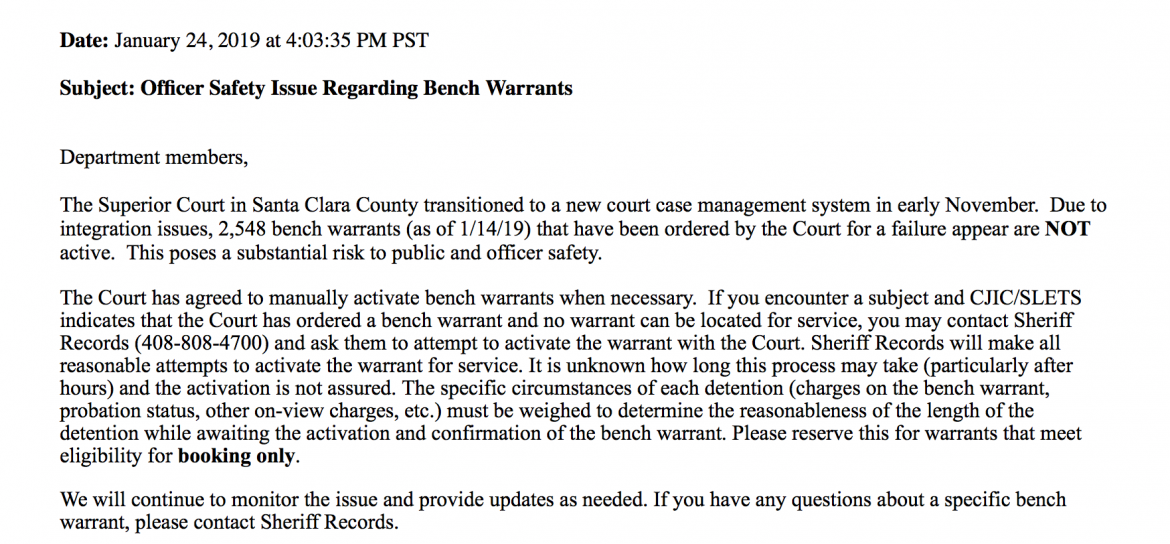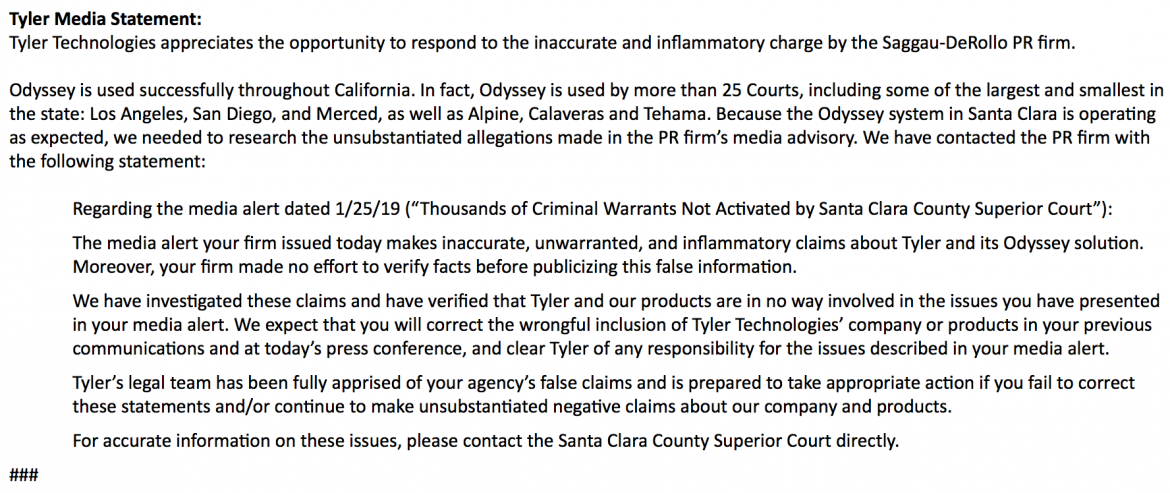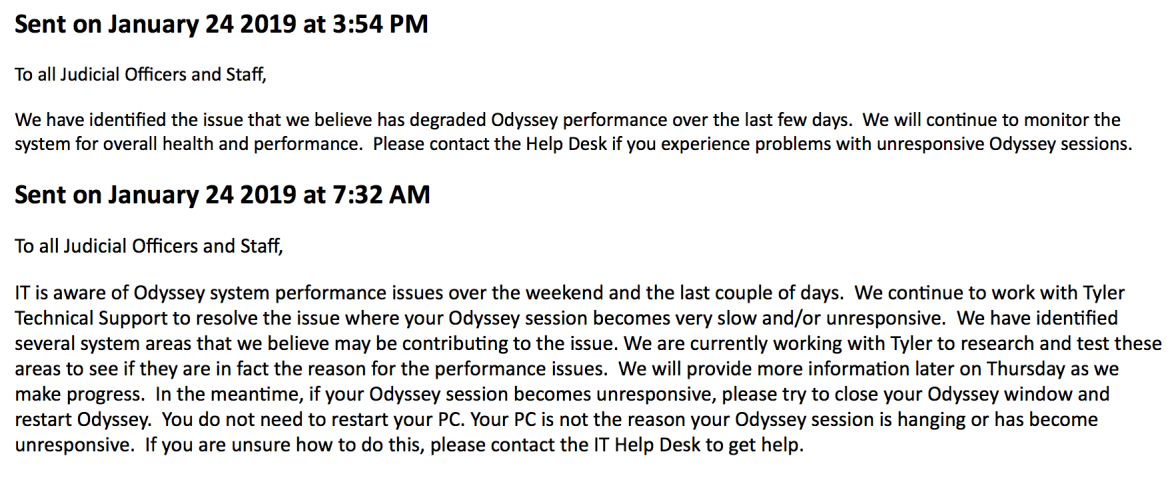San Jose’s police union wants lawmakers to investigate the local courts for deactivating more than 2,500 bench warrants in a new case management database.
The San Jose Police Officers’ Association held a press conference this morning to address what they called “ongoing and pervasive problems” with a software called Odyssey Case Management System, which the Santa Clara County Superior Court rolled out in November. The POA also unveiled a letter it plans to send to the California State Auditor and the Joint Legislative Audit Committee urging them to look into the matter.
Both the courts and the software manufacturer were taken aback by the charges. In a letter to the POA, Odyssey maker Tyler Technologies went so far as to threaten legal action unless the union’s public relations firm set the record straight.
Union officials, however, contend that missing logs of 2,548 bench warrants in Odyssey as of Jan. 14 put police in danger by leaving them with incomplete information about people they might encounter while out in the field. SJPD’s rank and file learned about the apparent glitches by way of an internal email, which said they could activate lapsed warrants on a case by case basis with help from the Santa Clara County Sheriff’s Office. But SJPD told officers to reserve that route for bench warrants with a high enough dollar amount to require booking the suspect in jail—that is, $15,000.

Source: SJPD
Texas-based Tyler Technologies categorically refuted claims that its software is responsible for endangering officers, as alleged by the POA. The company sent the union’s PR folks at Saggau-DeRollo a demand to retract what it called “inaccurate, unwarranted, and inflammatory” statements.
“We expect that you will correct the wrongful inclusion of Tyler Technologies’ company or products in your previous communications and at today’s press conference, and clear Tyler of any responsibility for the issues described in your media alert,” a company spokesperson wrote in an email forwarded to San Jose Inside.

Source: Tyler Technologies
Court officials also dispute the claim that Odyssey is at fault.
“This process is working and produces a warrant which is then ready for activation with the law enforcement agencies,” Court Executive Officer Rebecca Fleming wrote in a lengthy prepared statement Friday afternoon. “Officer and public safety is a priority for the court, which is why we have taken additional steps in the processing of warrants. The majority of the existing warrant backlogs are for low-level crimes referred to as misdemeanors. Arrest warrants for certain cases of concern are being expedited in the criminal departments for law enforcement agencies upon request. Moreover, search warrants have never been processed in the Odyssey system.”
Sticking with its 40-year-old case management software, the Criminal Justice Information Control (CJIC) system, was not an option, she added. “The court and the county justice partners have planned on the decommissioning of CJIC for several years,” she stated. “This process involves many of the systems being replaced and modernized.”
The courts initially authorized its Odyssey contract in April of 2014; it took four years beyond that to transition various departments, starting with the family court division in 2015. Initially, the goal was for all justice agencies to stop using CJIC, but concerns about the new program led to a compromise: the courts would enter information into Odyssey and a duplicate entry into CJIC, which police will continue to use until further notice. Thus, the warrants missing from Odyssey because of a glitch are at least listed in CJIC.
“The implementation of the system has allowed the court to begin to address backlogs created over a period of years from the severe underfunding the court has and continues to face,” Fleming explained in her official statement. “A systemic change such as this through all case types is difficult for all involved, including process and cultural changes. The court has worked to address and resolve all critical issues raised.”
In December, local law enforcement agencies asked the court to review and validate every warrant after it was transferred from one system to the other, which, according to Fleming, requires significant additional staff and overtime. She said she expects the county to help validate the data and to issue a status update by early next week.

Source: Santa Clara County Superior Court
Odyssey is used by thousands of courthouses throughout the U.S. When a judge makes a ruling—such as issuing or revoking a warrant—a clerk enters that information into the software database. Law enforcement can then reference that info online and use it to arrest or release people, or summon them to court.
The software company has previously come under fire for the opposite problem cited this week by the San Jose police union.
According to a 2016 article by Ars Technica, when the Alameda County Superior Court replaced a decades-old computer system with Odyssey, public defenders complained that it resulted in dozens of wrongful arrests. Some people were also wrongfully categorized as sex offenders. One man spent an extra 50 days in jail, prompting one defense lawyer to urge the courts to replace the system entirely, according to the Courthouse News Service.
A Tyler Technologies spokeswoman refuted claims in Ars Technica’s story that Odyssey was also responsible for glitches in Alameda County, and shared a fact sheet the company issued last summer in response to such allegations.
“Media reports that impugn Tyler and/or Odyssey in Alameda [County],” it reads, “are based on a variety of misunderstandings and mischaracterizations.”


Sounds like someone wrote a program to enforce the catch and release policy of sanctuary city’s. Perfect, now we don’t even catch them saving taxpayers and ICE millions on the costs of catching the wrong bad guys.
No more Catch, Release only!
It is not the only court system that needs to be investigated. Slowly the county has been back pedaling on giving judges special appointments on local committees. Judge Clark sits on a DV Council that didn’t even know guns were not being collected from spouses charged with domestic violence in divorce and custody cases.
Judge Patricia Lucas was appointed to the county’s Public Safety and Justice Committee as she was costing taxpayers money issuing unconstitutional orders that resulted in the arrest of Scott Largent the month before the recall vote of Judge Aaron Persky.
Protestors were embarrassing for the courts, and individual judges. Judge Lucas clearly did what she could to interfere with the local elections by scrubbing protestors from the sidewalks and issuing orders to keep the press from asking questions.
After years of pay freezes, court clerks had to strike to be paid a fair wage, as the county provided money to build a family courthouse that provides families less access to justice than any time in history.
The court spent millions of dollars to migrate paper documents to electronic files, but has made those files more costly and burdensome for members of the press and public to obtain.
Whistleblowers inside the courts report that when the courts were consolidated into the new family courthouse, the clerks went on strike during the move, and court documents, judgements and orders went missing because the temporary staff filing in during the strike were unqualified to handle the move.
The court’s appeal system is a mess as well, resulting in appeals being dismissed and people being denied access to the courts.
The police officers are right. The court systems are a mess and the police will continue to struggle to do their job until Santa Clara County District Attorney Jeff Rosen does his and cleans up public corruption in our county government and courts.
Or until the Attorney General comes in an looks at public corruption in the local courts.
Get it right. Too much is at stake when people are wrongfully arrested and then classified as sex offenders. Fix it or dump it!
Tyler Technologies is h1b infested. Maybe that’s part of the problem
https://h1bdata.info/index.php?em=Tyler+Technologies+Inc&job=&city=&year=All+Years
This isn’t the only system of the court to be examined. Slowly, the county has been pushing back to give judges special appointments to local committees. Judge Clark is on the DV Council that didn’t even be aware that guns were not being seized from spouses that are who are charged with family violence during divorce or custody cases.